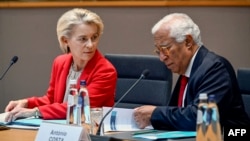Welcome to Wider Europe, RFE/RL's newsletter focusing on the key issues concerning the European Union, NATO, and other institutions and their relationships with the Western Balkans and Europe's Eastern neighborhoods.
I'm RFE/RL Europe Editor Rikard Jozwiak, and this week I am drilling down on two major issues: the chances of the EU suspending visa liberalization for Georgia and the next EU budget.
Briefing #1: Will The EU Really Suspend Visa Liberalization For Georgia?
What You Need To Know: European Union foreign ministers failed to take any meaningful decision on Georgia at their July 15 meeting in Brussels.
However, the European Commission did send a letter to Tbilisi warning that Georgians' visa-free travel privileges could be suspended if a number of conditions aren’t met by the end of August.
The question now is how serious this deadline really is, whether the Georgian government will budge, and ultimately whether Brussels can actually muster the will to act if Tbilisi doesn’t change course.
One thing was clear from the start.
Sanctions, even the latest proposal of slapping asset freezes and visa bans on two Georgian judges, were off the table.
Both Hungary and Slovakia had made it clear in preparatory meetings that they would not approve.
According to EU diplomats familiar with the discussions, the issue was briefly touched upon, but since unanimity is needed and clearly wasn’t attainable, it was agreed that sanctions work will continue at lower levels in Brussels.
This is a clear indication that restrictive measures of this sort won’t happen anytime soon.
And with the same ministers at the same meeting failing to adopt sanctions on Israeli West Bank settlers and Russian officials, it is increasingly obvious that the EU consensus rule is once again preventing the bloc from taking concrete foreign policy decisions.
Deep Background: Surprisingly, there was also no push to start a review of the EU-Georgia Association Agreement, which could lead to the suspension of certain provisions -- particularly those related to trade.
The question is how much of an effect this would have, as EU imports from Georgia under the agreement's free trade component are only worth around 200 million euros ($233 million).
Some EU member states did bring it up, and there is a real possibility that the ministers will return to it when they formally meet again in October.
EU foreign policy chief Kaja Kallas concluded that the option of triggering a review is very much on the table, especially since this move doesn’t require unanimity.
That leaves the suspension of visa liberalization as the remaining option to put pressure on Tbilisi -- a move that would require a qualified majority to trigger.
While RFE/RL understands that such a majority is emerging, it’s not universally popular among member states and it was made clear that it should be used as a very last resort.
Around eight member states, led by Italy, argued against it, saying it would hit the Georgian population at large and therefore would be disproportionate.
Kallas urged countries to be ready to react in case Tbilisi hasn’t complied with eight visa-free regime benchmarks that the European Commission put forward in a report back in December 2024.
These benchmarks include repealing the controversial "transparency of foreign influence" law and the equally contested legislative package on "family values and protection of minors."
Brussels also wants Georgia to align its visa policy with the EU list of visa-required third countries.
Drilling Down
- Now the question is whether the EU will really do something and what the deadline really is. The European Commission did send a letter to Georgia on July 15 noting that “in case of persisting non-compliance the Commission could take appropriate measures on the basis of Article 8 of the revised Visa Regulation, specifically activating the visa suspension mechanism.”
- Various Georgian media outlets circulated an early version of the letter, which didn’t include a specific deadline. It simply asked Georgian authorities "to update the Commission on the implementation of these recommendations and, if not already done, to take appropriate measures to address the issues raised in all Commission recommendations (in annex).”
- Interestingly, this was not the final version of the letter, which was identical to the draft apart from a revision of the above-mentioned paragraph. The final version, seen by RFE/RL, stated that “we would like to ask you to update the Commission on the implementation of these recommendations by the end of August and, if not already done, to take appropriate measures to address the issues raised in all Commission recommendations (in annex).”
- So, the end of August it is -- a date Kaja Kallas also mentioned in the press conference after the foreign affairs meeting.
- The question is how firm that deadline really is. The Georgian parliament is in recess for all of August. While the president can recall the chamber for emergency sessions to pass crucial legislation, few in Brussels believe this will happen.
- But the bloc is also “on holiday” for most of August. EU foreign ministers will come together for an informal meeting in Denmark on August 29-30 and again on the sidelines of the UN General Assembly in New York in September, but their first formal meeting at which any concrete decision can be made will take place on October 20.
- It seems member states would be more comfortable waiting for the European Commission’s next visa suspension mechanism report due later in the autumn or even the annual enlargement reports, which the Commission plans to publish later this year, assessing the progress of all EU candidate countries. As the ministerial meeting showed, Brussels tends to kick the can whenever consensus is lacking.
Briefing #2: Proposed EU Budget: What's In It For New Members?
What You Need To Know: The European Commission has put forward its vision for the next long-term (2028-2034) European Union budget -- a record-high 2-trillion-euro ($2.3 trillion) framework, with a doubling of funds for both Ukraine and EU foreign policy in general, and a fivefold increase in defense-related investment.
It is worth remembering that the July 16 proposal is just the opening shot in a battle that will consume Brussels for the next two years.
All 27 EU member states, which provide the vast majority of the cash through national contributions linked to their gross national income (GNI), must approve the proposal.
But this is not likely to happen until what is expected to be marathon, last-minute negotiations in the latter half of 2027.
So don’t count on the budget remaining at 2 trillion euros by then -- or on Ukraine, foreign policy, and enlargement policy getting as much financial support as the European Commission presented on July 16.
Most of the net contributors -- in other words, those who pay more into the common budget than they receive back -- are mainly richer northern member states such as Germany, the Netherlands, and Sweden, and they aren’t keen to increase the budget at all.
Deep Background: The commission proposal is already a 600-billion-euro ($700 billion) jump compared to the 2021-2027 budget.
And with several countries grappling with low growth, ballooning deficits, and budget cuts, the idea of the EU expanding its coffers right now could be useful ammunition for Euroskeptic parties railing against Brussels across the continent.
To appease member states on this, the European Commission is proposing two things.
First, new “own resources” so that the budget isn’t so dependent on member state contributions. Some of the new ideas include a tobacco tax and levies on large corporations.
Few think this will succeed or have much impact.
So instead, the second thing that the commission proposes is to send most of the cash back to member states in the shape of support for farmers, fishermen, and poorer regions of the bloc.
This is already the biggest section of the budget at the moment -- worth a total of 865 billion euro ($1 trillion) of the 2-trillion-euro proposal.
It probably won’t shrink.
Drilling Down
- Interestingly, there is now a proposal to allocate 131 billion euro ($152 billion) for defense, which would be a fivefold increase compared to the current level.
- Several member states, notably Denmark and France, have indicated that the EU must become more of a military player, especially as the United States might dedicate fewer military resources to the continent in the coming years.
- If the proposal is not watered down, this would signal real intent on the issue.
- So, what about the foreign policy aspects of the commission’s plan?
- It’s all grouped under the heading “A Stronger Europe In The World” and totals €200 billion ($233 billion).
- This is a doubling of the previous budget and contains everything from humanitarian aid, various foreign missions the bloc has -- such as a monitoring mission in Armenia -- to pre-accession funds for EU candidate countries in the Western Balkans and the bloc’s eastern neighborhood.
- The money proposed for pre-accession is around 40 billion euros ($46 billion), an increase from before, but there is still no breakdown of how much cash each country will get.
- What is interesting, however, is that there is a revision clause in the proposal which means that the budget will be reworked if a country joins the club during the 2028-2034 period.
- After all, members tend to get more money than candidate countries. And given that nations like Albania, Montenegro, and possibly even Moldova could join within this time frame, they stand to gain even more.
- It is worth remembering here that Ukraine has been given a separate heading altogether.
- While Kyiv, of course, can benefit from the 200 billion euro of accession and humanitarian cash, European Commission President Ursula von der Leyen has promised a dedicated 100-billion-euro ($116 billion) pot for the reconstruction of the war-torn country.
- Between 2024 and 2027, this so-called “Ukraine facility” amounts to €50 billion ($58 billion) in loans and grants, financed through common EU borrowing, which all member states guarantee to repay.
- The question is whether a country like Hungary, which has been skeptical about all things Ukraine in recent years, will agree to this -- especially as von der Leyen announced that rule of law conditionality applies to all the funds in the new budget. This conditionality existed to a certain degree in the previous budget and allowed Brussels to freeze billions heading to Budapest.
- Watering down conditionality in order to get more money for Ukraine already seems like one of the many compromises that will now have to be struck for this budget to eventually go through.
Looking Ahead
The European Union is not quite on holiday yet. This week the presidents of the European Commission and European Council Ursula von der Leyen and Antonio Costa, respectively, are heading to Asia.
On July 23, they will be in Tokyo for what is expected to be a cordial EU-Japan summit.
The next day, the atmosphere might be tenser as they jet to Beijing for an EU-China summit in which they will meet with both President Xi Jinping and Premier Li Qiang.
Don’t expect big announcements for either summit.
That's all for this week!
Feel free to reach out to me on any of these issues on X @RikardJozwiak, or on e-mail at jozwiakr@rferl.org.
Until next time,
Rikard Jozwiak
If you enjoyed this briefing and don't want to miss the next edition subscribe here.








